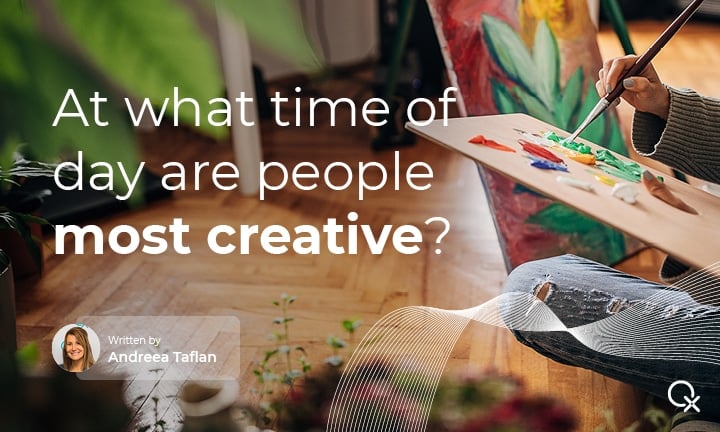
On some days, we are thriving in the morning, burned out in the evening. On others, we are barely able to come up with two sentences in the morning yet write our best work at night. Chances are, you too are familiar with the experience of going through inexplicable shifts between being on top of your game and feeling uninspired. So, the question is: at what time of day are people at their most creative? And perhaps more importantly: how can you take charge of your creativity levels to make the most of every day? Let’s explore.
Creativity is, basically, the skill to come up with something that’s new and adequate for its purpose. To find freedom even in the limitations. To see the bigger picture when routine and bias are blocking the view. To find the easiest solution to a seemingly complicated problem. Do you have a different definition of creativity? Yours probably has truth in it too.
Fact is that creativity is extremely multifaceted. It is present in all of us even when we don’t realize it. Sure, some people are born more creative than others. But the time of day at which we call upon our creative skills plays a crucial role as well. And, contrary to what most scientists believe, that time of day is not the same for everyone.
The scientific consensus is that most of us are at the peak of their creativity in the morning, as studies confirm that the prefrontal cortex – responsible for planning complex cognitive behavior, personality, decision making, and moderating social behavior – is most active during the morning hours.
Yet there are a lot of other factors that influence creativity and productivity every day. For example, the circadian rhythm or sleep-wake cycle. Depending on your circadian rhythm, you might be at your most productive in the morning and describe yourself as a ‘morning person’. Your inner clock urges you to wake up early, and as soon as you’re awake you’re good to go. Meanwhile, many people get more done in the evening or deep into the night because their circadian rhythm is shifted a little backward. Additionally, age en levensstijl can also have an influence on creativity.
It is good to note, however, that feeling your most alert and focused is not necessarily the time when you are at your most creative. On the contrary, a study about creative problem solving by Mareike B. Wieth and Rose T. Zacks, published in the journal Thinking & Reasoning in 2011, concluded that your non-optimal time for focusing and analyzing might be your optimal time for creative thinking. Have you ever been caught off guard by an amazing idea while taking a relaxing shower before going to bed? Or solved a problem you’ve been working on all day while dozing off on the couch in front of the television? This might be the reason why.
‘Morning person’ or ‘night owl’, the time of day may have some influence on your creativity levels, but what’s perhaps most influential is your state of mind. Entering a state of relaxed focus might be the key to mastering your creativity. If you strive to learn and achieve more, neurofeedback sessions (brainwave biofeedback) are a very accessible method to efficiently train your brain to act a certain way and to improve your sleep, mood, attention span, productivity, and creativity. For instance, Neuro Linguistic Programming, or the panel simply known as the NLP in OMNIS is a perfect means to work on stress profiles while boosting creativity.
Take a chance and make the most of it. You won’t regret it.
Over Andreea Taflan
Andreea Taflan is de CEO en medeoprichter van QX World. Ze heeft bedrijfsmanagement en marketing gestudeerd en heeft een master in public relations en communicatie. In 2005 werd Andreea de rechterhand van de oorspronkelijke ontwikkelaar van de biofeedbacktechnologie en sinds 2012 heeft ze het voortouw genomen bij de verdere ontwikkeling van de technologie. Momenteel leidt ze zowel de software- als de hardwareafdeling bij QX World en wordt ze beschouwd als een van de topexperts op het gebied van biofeedback.
+1 (989) 681-1063
+1 (856) 322-8589